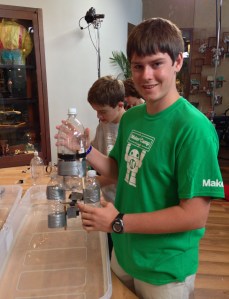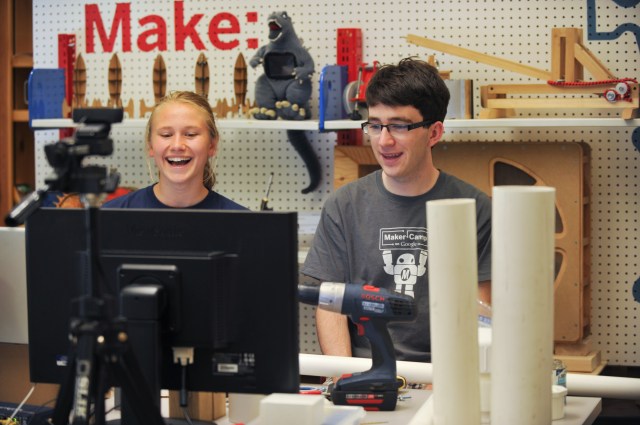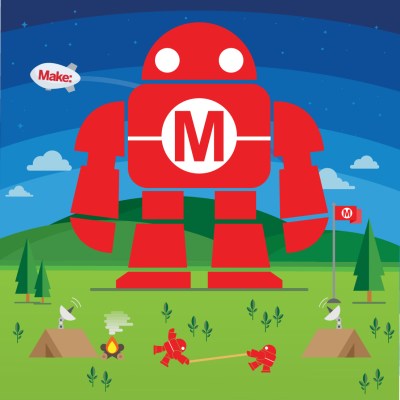Science class is about to look a lot more boring. One million kids logged on to Maker Camp last summer, so today Google and Make Magazine (affiliated with Maker Faire) announced the second year of its online summer camp, which teaches teens to build, hack and explore. The six-week program on Google+ includes virtual field trips to NASA, CERN, and Disney Imagineering plus the opportunity to make tensile strength towers, glowing candy and potato canons.
Each day Maker Camp kids join counselors on a new project or field trip and use Google Hangouts to get advice and share their experiences. Campers can join from home on their desktops and via mobile, and — new this year — they can visit a local Make Camp affiliate site, such as a library, where they can congregate in person. Google hopes the campers will share photos and videos of their creations on its social network Google+.
Despite Google’s recent real-world hardware endeavors like self-driving cars and Google Glass, its roots are in the intangible world of ones and zeros. So it partnered with Make magazine, leaders of the maker movement that encourages do-it-yourself science and art projects. Maker’s Bay Area event saw 120,000 attendees in 2013, and Make magazine has a readership of 300,000.
Dale Dougherty, founder of Maker Faire and Make Magazine, explains that the virtual summer camp “isn’t a textbook. It’s not like ‘let’s learn about velocity.’ It’s ‘let’s build cars and rockets and figure out what makes them go faster.’ We’re trying to figure out a set of experiences that gets you interested in science.”
At the kickoff event at San Francisco’s Exploratorium, I watched a few young campers race boats they built from two-liter soda bottles. As they learned fluid dynamics and rotor technology through trial and error, the smiles on their faces illuminated the potential for a more participatory approach to science education.
One camper, Isaac, told me he decided to join the program after creating a Tesla coil as part of a young makers club. When I asked why he wanted to attend Maker Camp he explained that “Otherwise, I’d probably just be sitting around playing video games.”
 Not designing video games, not building a tree house. Just sitting around. And that’s a problem.
Not designing video games, not building a tree house. Just sitting around. And that’s a problem.
Right now, schools are doing kids a disservice. Science is portrayed as a mixture of theory and memorization. Students do “labs”, but they’re often just following heavily scripted sets of instructions rather than testing their own hypotheses.
That’s a shame, because the real scientific process is a lot more fun, and those foundational experiences with tinkering can turn kids into serious engineers down the road.
Dougherty tells me the whole point of Maker Camp is “to see yourself as a producer, a creator, and think of science as something you get to do things with. It starts with silly stuff but grows into more meaningful things. Science is changing the world around us and we’re either part of it or subject to it. I want to infect kids with the kind of gene that has them saying ‘I want to get my hands on this.”
That’s much different from what Isaac tells me his science class is like. “All the testing. I don’t know how useful it is.”
Teens can sign up now for the free Maker Camp, which starts today.

